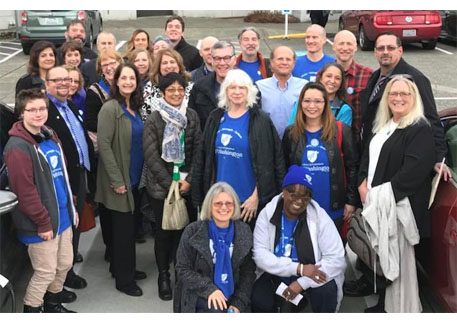STATE GOVERNMENT
School funding, negotiating rights – at last
The following story appears in the Washington State Labor Council’s 2018 Legislative Report (HTML or PDF) published in May.
SECRETARY TREASURER’S COLUMN
By LYNNE DODSON
Campaign materials for Republicans and Democrats nearly always tout the candidates’ strong support for public education. Yet, with a divided Legislature over the past several years, the slogans on campaign literature never materialized into real progress on funding our state’s schools.
This year was different. With Democratic majorities in both the House and Senate, we saw improvements in the system from kindergarten through college.
Top among the improvements in the K-12 system was money to increase teacher salaries, funding for special education, changes to the appropriations model from last year that will ensure school districts don’t lose revenue, and additional funding to support Running Start students.
Our state’s higher education system was made stronger this session, opening up opportunities to students to pursue college. Chief among these was the passage of HB 1488, ensuring Dreamers have access to state financial aid, regardless of the barriers the federal government may impose (see separate story).
Last session’s failure to pass a capital budget impacted our two-year colleges as well. This year, the State Board for Community and Technical Colleges received their full capital budget request, meaning needed major and minor construction and design projects can finally get done.
 Community and technical college faculty have had some collective bargaining rights for decades. They’ve been organized into collective bargaining units almost since the two-year system was established. While faculty in every one of our two-year colleges are members of the AFT or the WEA, they haven’t shared the same right to bargain salary increases that teachers in the four-year college and K-12 systems have. Faculty in the two-year system have had to rely on appropriations from the Legislature for salary increases. That’s meant wages have essentially stagnated for teachers in our community and technical college system.
Community and technical college faculty have had some collective bargaining rights for decades. They’ve been organized into collective bargaining units almost since the two-year system was established. While faculty in every one of our two-year colleges are members of the AFT or the WEA, they haven’t shared the same right to bargain salary increases that teachers in the four-year college and K-12 systems have. Faculty in the two-year system have had to rely on appropriations from the Legislature for salary increases. That’s meant wages have essentially stagnated for teachers in our community and technical college system.
Our two-year college system is chronically underfunded. These are the colleges that students from working-class backgrounds can afford to attend, that provide related instructional content for many apprenticeship programs, that were established to respond quickly to provide technical and professional training in new employment areas, and that are in nearly every region of our state. They’ve been underfunded and neglected for decades. And while tuition costs have risen in our two-year and four-year colleges, community and technical college faculty and staff have watched any extra funds colleges have managed to save get siphoned into the creation of more administrative positions, and higher salaries for those in the top positions.
This year, after more than a decade of attempts to open up the possibility of bargaining for salary increases at the local level, the Legislature finally passed HB 1237 enabling college faculty to bargain local college funds for salaries. During testimony on HB 1237, lawmakers heard from faculty who care deeply about their students and their schools, who are leaving the profession they love because they can’t afford to teach.
HB 1237, sponsored by Rep. Mike Sells (D-Everett), doesn’t automatically give two-year college faculty the raises they deserve. But it gives them the right to fairly negotiate their salaries. At last.
 Lynne Dodson is Secretary Treasurer of the Washington State Labor Council, AFL-CIO, the largest labor organization in the Evergreen State, representing the interests of more than 600 local unions and approximately 450,000 rank-and-file union members.
Lynne Dodson is Secretary Treasurer of the Washington State Labor Council, AFL-CIO, the largest labor organization in the Evergreen State, representing the interests of more than 600 local unions and approximately 450,000 rank-and-file union members.
Click here to see more reports from the Washington State Labor Council’s 2018 Legislative Report. Or download the entire 8-page PDF.





